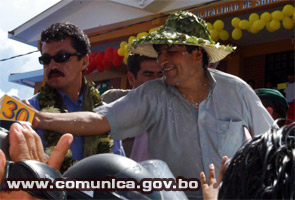Oh, coca, sacred leave of Bolivia!
April 3, 2006

In the same respect he preserves loyalty to a thousand year old Bolivian tradition of coca leaves use. For the indigenous Indian population of the country (about 70%) coca – is a «sacred plant», whose leaves have been used for ages both in religious ceremonies and in everyday life as an effective means to maintain energy, especially in high-mountains. In in the corps of diplomats in La Paz everybody, including the US representatives, regularly take tea made of coca leaves to maintain good spirits and freshness while executing their service duties.
While preparing himself for presidency Evo Morales promised that he would uphold the right of his country to cultivate coca leaves both for domestic use and for commerce at the foreign market. In addition to coca leaves tea «the sacred leaves» are used to produce soap, tooth paste, shampoo. Recently much is spoken about coca leaves flour that can be used as a food additive, for example while making buns for school children: coca leaves contain more calcium and phosphorus than in milk.
Evo Morales understands protection of coca leaves as protection of national traditions, and plans to resort to any necessary foreign policy initiatives so that coca leaves trade was recognised legal by the international community and coca leaves deleted from the «black list» of the Unites Nations Organisation where they were entered in 1961.
Morales's slogan - «Coca – yes, cocaine – no!» is supported by the majority of the Bolivian population. Morales is ready to give all his strength to the fight against cocaine production and criminal organisations for its trafficking to the USA. However, legal land plots to peasants «cato» (1600 square meters) that are allocated to grow coca, cannot be subjected to any forcible actions with the aim to destroy coca. Peasants also have to adhere to the existing rules of the game and avoid overproduction of coca.
It is known that surplus «sacred leaves» is absorbed by the ominous world of drug traffic, whose bosses have been hiding in the USA for years, and possessing reliable contacts in power and financial structures and therefore are practically untouchable. Only small fry of this profitable business get behind the bars, whereas the sharks are safely abiding in New York, Las Vegas and Miami. It was about this that Evo Morales used to speak more than once, but his words are hushed up or rendered distorted by world mass media. Moreover, mass media keeps the tendency to present the Bolivian president as a «drug baron», which is a flagrant distortion of facts. Once the president, Morales agreed to preserve the post of head of the trade union of peasants - cocaleros in Chapare. He did this, first of all, to have an efficient control over the trade union and keep its ranks from penetration of agents of criminal drug bodies that supply dozens of tons of cocaine, basically of Colombian origin.
Evo Morales does not get tired in demonstrating that he was the advocate of the «civilised coca» and implacable enemy of cocaine. Will they accept in western countries, and first of all in the USA, his clear-cut stand in the field of fighting the drug business «coca – yes, cocaine – no» as a new strategy to fight production of this drug, will be shown by the future.
Meanwhile, the President Morales during his meetings with foreign political leaders presents gifts that in this or that way underline «absence of harm» in coca, if it is dealt by people, devoted to national traditions. Recently Evo Morales presented the portrait of Simon Bolivar, the Liberator, to the President of Colombia Alvaro Uribe. The portrait, made from thousands coca leaves, was received by the Colombian with gratitude. A small guitar – charango – decorated by similar leaves was presented by the President to Michele Bachelet, president of Chile at the day of her Inauguration. Even Condoleezza Rice was lucky to get such a present. However they say that she gave her charango into the US embassy's charge: coca leaves are illegal across the border of the USA and Condoleezza does not want to have any problems with the law in her own country.
Battle for legalisation of coca leaves continues.
"Coca no es cocaina
Coca es la hoja sagrada
?Jallala! Bolivia!" (lyrics from a popular Bolivian song)